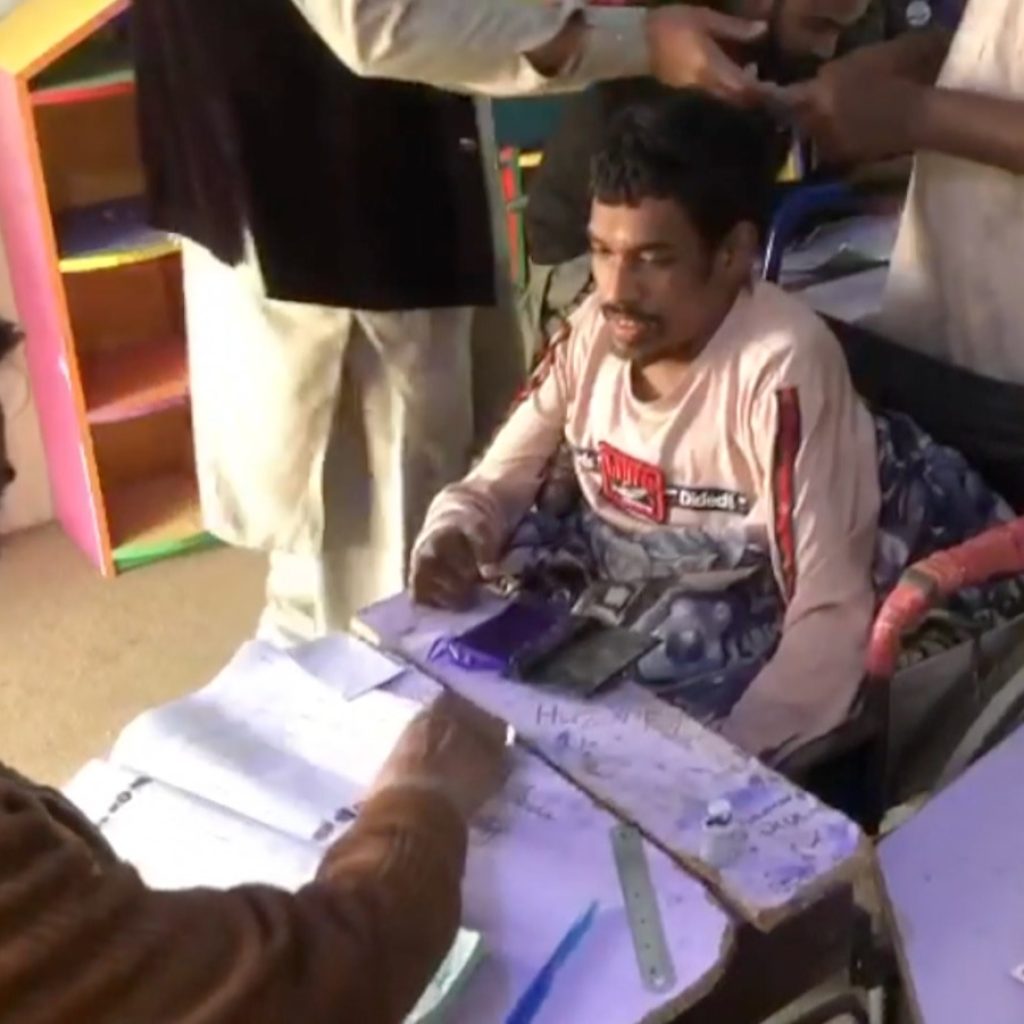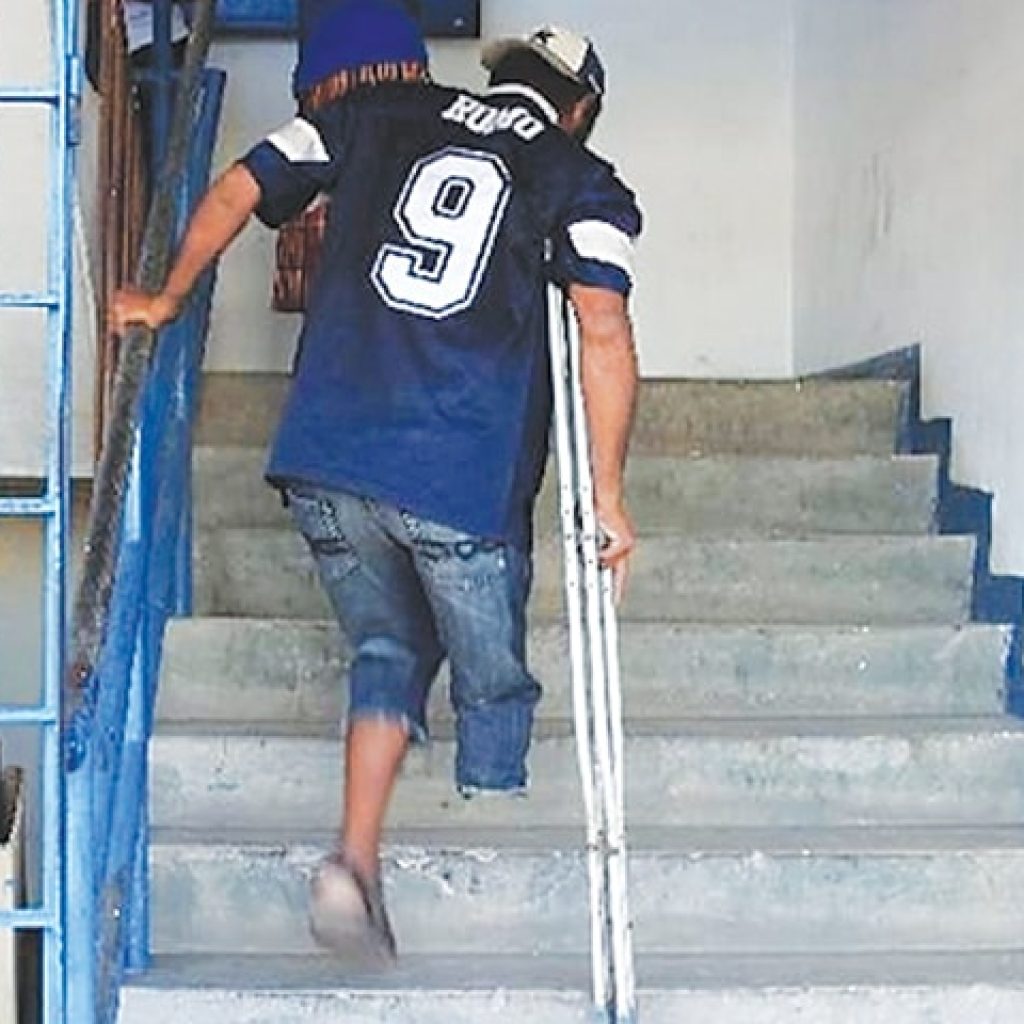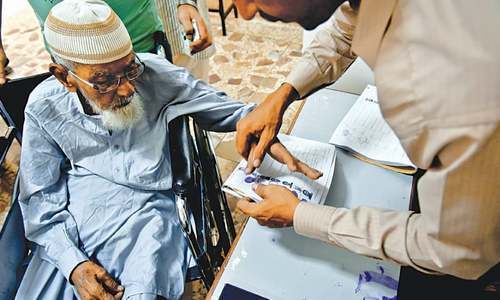Did you know that there’s an entire chapter in the Election Act 2017 dedicated to facilitating the voting process for differently-abled individuals?
But wait, there’s more – Pakistan has also inked its commitment to inclusion by signing Article 29 of the United Nations Convention on the Rights of Persons with Disabilities, spotlighting the participation of disabled individuals in political activities.
The Pakistani government has made amendments to the legal framework for the electoral rights of differently-abled individuals through the Elections Act 2017 and Electoral Rules 2017, aligning with the convention’s spirit.
Section 74, Chapter 5, Election Rules 2017: ‘Manner of marking ballot paper if voter is incapacitated’ delves into exactly this.
The section said that if a voter is completely blind or in any other condition physically requiring assistance, the Presiding Officer may permit them to be accompanied by a companion who is not less than eighteen years old. “If the disability is such that the voter cannot mark the ballot paper themselves, the person accompanying the voter can mark the paper on the voter’s chosen candidate, provided that the accompanying person is not the candidate or the candidate’s agent.”
If the companion has marked the ballot paper, the Presiding Officer shall clearly inform them that they have marked the ballot paper on the voter’s chosen candidate, and it is mandatory for them to maintain the secrecy of the vote and not disclose information about the elected candidate to anyone else. The Presiding Officer will prepare a list of such voters whose ballot papers have been marked by their companions.
In case a disabled voter has no finger at all to receive a personal mark of indelible ink the personal mark shall be applied on the backside of lobe of his right ear.

A physically challenged person attempting to cast his vote. Picture Credit: Sibte Hassan
Neither the law nor election rules make any mention of mandatory portable ramps for physically challenged voters, making it difficult for them to enter polling stations. The majority of polling stations are located inside schools, where the only entry is through stairs. In such situations, there have been instances where physically challenged voters are brought into the polling stations by being lifted onto someone’s lap or arms.

A physically challenged man using crutches, attempting to enter a polling station with stairs. Picture credit: CPDI
Differently-abled population
In Pakistan, differently-abled people encounter various obstacles while exercising their right to vote.
According to the latest data from the Pakistan Bureau of Statistics until 2021, the country has registered 371,833 persons with disabilities, with Sindh accounting for 69,387 of them. While the 1998 census reported 495,249 disabled individuals in Sindh, recent population figures are yet to be released, making it challenging to estimate the current number of special needs voters.
The Challenges
Mohammad Hammad, a resident of Karachi’s Orangi Town, gained attention during the 2018 elections for his determined journey to a polling station. However, he revealed that from the entrance to the polling booth, he relied on assistance at every step. Hammad emphasized that the challenges extend beyond voting, asserting that accessing any institution without assistance poses a significant challenge.
He praised the Sindh government initiative where the newly introduced Peoples Bus service has facilitated individuals with disabilities. While appreciating the effort, Hammad pointed out that the absence of lifts at different bus stations for the Bus Rapid Transit (BRT) Green Line makes the bus service less accessible for them.
Hammad emphasized that addressing the issue of accessibility is not limited to voting but is a broader challenge that needs attention. He argued that polling stations must be made easily accessible for individuals with special needs to ensure their active participation in the democratic process.
Mohammad Hadi wasn’t born with a disability; instead, the clutches of diabetes snatched away both of his legs later. Fifty-six years old, Hadi vividly remembers the elections when he made his way to the polling station, determined to cast his vote despite the challenges posed by his physical condition. According to Hadi, disability itself is not a weakness, but the lack of facilities and practical wisdom hinders the enthusiasm for voting.
In the 2018 elections, Hadi, accompanied by family members, embarked on the journey to cast their votes. Although they received support from many, the transition from entry into the polling station to moving from one place to another posed a significant challenge. Hadi emphasizes that while the vote is a responsibility, many individuals with special needs abstain from fulfilling it due to fear.
Absence of Data
Working towards the betterment of differently-abled individuals, Network of Organizations Working For People With Disabilities Pakistan (NOWPDP) Deputy Manager for Engagement, Hasnain Haider, highlights the absence of comprehensive data regarding disabled individuals in the country.
The data provided by the organization, indicating 16%, is sourced from the World Health Organization. Haider stresses the need for city-level data to effectively address the concerns of differently-abled individuals.
Haider expresses concern about the Election Commission of Pakistan’s dismal state, revealing that the 1% reserved seats for disabled individuals in the Union Council elections remained unrepresented due to the commission’s inadequate conditions or indifference towards their issues.
He further informs about plans to propose to the election commission the establishment of special booths for differently-abled individuals, yet the decision remains pending.
A Gallup Pakistan report reveals that 0.44% of Pakistan’s population is disabled, contrasting with the 1998 census which reported a rate of 2.38%. The disabled population, constituting more than two-thirds of the population, is significantly higher than the average illiteracy rate of 41.9%.
What about the Visually Impaired?
As of February 2021, there are 19,643 visually impaired individuals among disabled persons in Pakistan. To participate in the electoral process, a National Identity Card is necessary. However, for special identity cards, a disability certificate is required, obtained from hospitals and provincial or social welfare departments.
The process of obtaining the certificate faces challenges, and some non-governmental organizations provide assistance.
Still, the lack of transparency raises concerns about how individuals are included in the list of special needs voters. Special National Identity Cards for differently-abled individuals include an emblem of a wheelchair.
Pakistan has four types of disabilities: physical, mental, visual impairment, and hearing impairment. Accessibility to mobile units for the issuance of identity cards for differently-abled individuals should be made a priority.
Measures on the Government Level?
In 2018, the Sindh government changed the name of the Special Education Department to the Department of Empowerment of Persons with Disabilities, in line with the implementation of the Sindh Empowerment of Persons with Disabilities Act 2018.
Additional Secretary of the department, Ghulam Mohiuddin, mentioned that they are collaborating with 19 partner organizations. Sindh is the only province where a 5% job quota is reserved for disabled individuals. Recently, for the issuance of Disability Certificates, one-window operations were conducted in various districts of Sindh to facilitate disabled individuals.
The Department of Empowerment of Persons with Disabilities has taken measures to improve access for disabled individuals to residential and commercial buildings in the province. This is achieved by ensuring that the Sindh Building Control Authority enforces its laws pertaining to physically challenged people in buildings.
Ghulam Mohiuddin stated that the election commission’s cooperation has been commendable. It is ensured that in polling stations of government schools where ramps or lifts are not available, election staff will assist disabled individuals.
He said that their department is providing 23 special vehicles for 66 Special Education and Rehabilitation Centers across Sindh, with the inauguration to be done by the Chief Minister this month.
He mentioned that though the exact data of disabled individuals cannot be disclosed, they have issued more than 36,000 Disability Certificates since 2018. Efforts are also being made at the community level to raise awareness about disabled individuals.
Disabled Welfare Association (DWA) is working in collaboration with the Sindh government for the welfare and well-being of disabled individuals. They have requested the election commission to provide a list of disabled individuals at polling stations so they can ensure the availability of wheelchair chairs where the turnout of special individuals is higher.
President of DWA, Saima Ali said that the Election Commission of Pakistan is making every possible effort to provide facilities for disabled individuals. The election commission has asked them to connect them with different welfare organizations like JDC, Edhi & Chippa.
She mentioned that they had a first-ever mock drill exercise for persons with disabilities in collaboration with the election commission for how to cast a vote arranged on December 2, 2023 where they mobilized 1500 physically challenged people.
Saima mentioned the initiative of awareness videos made by the organization and the printing of Braille information for visually impaired people as well. She is hoping for the Braille Ballot papers to be printed for the elections in the future. She has requested the election commission to provide NADRA Vans on polling day for the mobilization of a person with disabilities as their organization doesn’t have sufficient funds.
Election Commission’s Version
According to the Spokesperson from the Election Commission, Nadeem Haider, the printing of Braille ballot papers is an expensive process. Additionally, he said, identifying the polling station due to the lack of clear data is also challenging.
However, he said, election staff have been trained to assist disabled individuals, and efforts would be made to minimize their difficulties. The election commissioner, he said, is trying to establish polling stations on ground floors so the people could access them easily. He said that they are connected with all the concerned organizations for assistance of physically challenged people.
Experts believe that there is a need to make the website of the Election Commission of Pakistan accessible to visually impaired individuals through audio recordings. Providing instructions in audio format on the website for visually impaired individuals will make it easier for them.
In the General Election of 2024, the Election Commission of Pakistan should launch a media campaign to encourage eligible disabled voters to cast their votes. Additionally, political candidates in their ongoing election campaigns should also emphasize this initiative.



